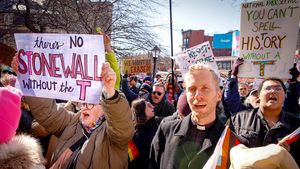It's been 30 years since Alan Hollinghurst published his remarkable first novel, The Swimming-Pool Library, an exuberant epistle to the pleasures of men's bodies set in London in 1983, just before AIDS would bring the post-Stonewall bacchanal of liberated gay sexuality to an abrupt halt. Hollinghurst's debut was a landmark in fiction (it went to number two on the U.K. bestseller lists in its second week of publication), but it also established themes that have percolated through his subsequent novels, most notably in The Line of Beauty, winner of the 2004 Man Booker Prize. In that book, a young man from the suburbs is punished for violating the protocols of class after insinuating himself into the household of a well-to-do friend he lusts after.
Related | Authors Marlon James and Nicole Dennis-Benn on Being Queer and Jamaican
The Line of Beauty was a touchstone for Marlon James, who read it in 2005, just as he was publishing his first novel, John Crow's Devil. James, too, would go on to win the Booker Prize, for A Brief History of Seven Killings, his breathtaking 2014 novel in which the real-life assassination attempt on Bob Marley is used to interrogate the lives of a group of characters pulled into each others' orbits. James expertly weaves a series of overlapping narratives from a cast of desperados, many of whom are destined for an untimely end. Although very different novelists, Hollinghurst and James share a fearlessness and bravado that make their works singularly their own. Hollinghurst, visiting the U.S. to promote his new novel, The Sparsholt Affair, sat down with James to discuss class, race, and sexual identity.
Marlon James: Though they come from radically different places and times, the one thing that struck me about The Sparsholt Affair and The Line of Beauty--my favorite Booker winner--is, ultimately, no matter what the circumstance or the person, everything boils down to class. Both books, but particularly Line of Beauty, made me think of the first line of Jean Rhys's Wide Sargasso Sea: "When trouble comes, people close ranks." Which is what everybody does at the end of Line of Beauty--close ranks, absorb the rich and dying Wani, but lock Nick out. Is class the line people ultimately can never cross? Because not even common struggles, like being gay in Britain, allow anybody to cross it.
Alan Hollinghurst: Now that you ask this question directly, I wonder if I haven't always been exploring the presence and pressures of a class sense in my books, as well as seeing them as a source of comedy. Of course, this has been a subject in the English novel almost from the start, but I've generally tried to show it ironically. So in The Swimming-Pool Library the narrator is a young aristocrat who is barely aware of the sources of his own privilege. If a magical thing about gayness was that it allowed people to connect across barriers of class and race, in a sort of double defiance of the status quo, it was also the case that the resulting relationships were often exploitative, or very hard to sustain. I'm interested in all this--and by now also a bit bored with it.
MJ: Funny, it made me think of two things, one of which is in my novel, A Brief History: First, how Britain spent centuries teaching people in the colonies that it's not about race, it's class, and therefore achievable. Which is why West Indians, after offering their lives in both world wars, were stunned by Britain's response to them coming to the U.K. A sign like "No Blacks" didn't offend so much as utterly shock them, because colonialism taught them to never think about themselves as black before--only poor, rich, middle-class, working-class, and so on. It's the rich East Indian student finding out he's a "coolie," or the Rhodes scholar from Jamaica realizing that, no, he's not invited to that house.
AH: I have a gay Cameroonian friend I helped secure asylum for in England. He'd never been out of Cameroon before he came to England three years ago, and his line is that he'd never experienced racism before, and it came as an astounding shock to him, in a million ways both dramatically evident and in gradations of subtlety.
MJ: It's in the gradations that I think people miss it. I don't anymore. I think the second time I came to the U.K. someone asked how I was enjoying it, and I said, "I love Britain--your racism is so cute here."
OUT: Can you expand on that?
MJ: You know, the patronizing--the surprise that I can actually carry a sentence in standard English, asking where in the U.K. I studied. I said to somebody, "Before you and I start offending one another, why don't you just make the assumption of civilization before I prove otherwise, because if I came from Denmark, you'd never ask me if there are cars in my country."
OUT: Marlon, you've said The Line of Beauty is your favorite Booker winner.
AH: You haven't read them all, though, surely?
MJ: I've read a lot of them, but I read The Line of Beauty in 2005, and a lot of that book connected with me because in some ways I recognized myself in it--in Nick, in the aspirations, in being surrounded by wealthy people. I went to a school called Wolmer's Boys' School--I was very posh, and the thing about that school is that even when Jamaica made education free (you could go to any school you wanted) everyone still maintained the class divisions. So, I'm at Wolmer's, and I'm kind of an anomaly, because it's still very much a gentleman's school, to the point where I could walk around New York and tell you who went to Wolmer's. It was like a finishing school for boys. But at the same time, The Line of Beauty is also such a fresh novel in the sense that it was talking about Thatcher and England--post-punk, post-disco, and with second-generation immigrants, as opposed to people you read about in [Andrea Levy's] Small Island and most of the novels where black people show up. It's a very, very new comedy of manners, and, in some ways, it reminds me of an American book, [Claire Messud's] The Emperor's Children.
OUT: Both have a mildly objectionable protagonist you actually root for.
AH: I love luring people into surprising positions. I just love all the moral mobility of fiction. You're setting people free in this world, and they're constantly trying to work out what their relationship is to these characters, and if the book's any good it would be exactly like it is in real life--you don't know exactly what you think of people, and you're constantly revising, updating your opinion, or perhaps you can't possibly reach a single uncomplicated opinion about them.
MJ: Usually I have a complicated, sometimes even tormented relationship with characters. That was something very important for me when I was writing any character--that they do things I wouldn't approve of.
AH: Exactly. In Seven Killings, they're not doing things you really approve of.
MJ: [Laughs] I wanted a character like Josey Wales, who at one point kills a bunch of people, including a pregnant woman, but who you miss once he dies.
AH: I love that figure in your book, Weeper, who is gay and is recognized by other people around him as gay, though nothing is said about it.
MJ: Yeah, it's a weird gangland "Don't ask, don't tell" thing, which also used to happen back then. Yes, they killed dozens of people, but they are really open-minded! [Laughs]
AH: I like a broad-minded killer.
MJ: One of the most notorious gangsters in Jamaican history was this guy named Zekes, and I named him Funny Boy in my book as an inside joke for Jamaicans because funny is also a synonym for gay.
AH: He's a bit funny.
MJ: Zekes's style was to corner you to kill you, but if you blow him he'd preserve your life. Of course, he's not going to save the guy who gave him a blowjob--so as soon as he came, he'd kill him. Usually he had the good sense to pull out and cum, and then shoot him. He didn't pull out once, so the way he got convicted was that his DNA was found in his victim's mouth. Zekes had a press conference, not to say he's not guilty--he killed him--but to say that he's straight. His press conference was, "I have 40 girlfriends and I have dozens of children." He couldn't explain how his DNA ended up in the guy's mouth.
OUT: How real is the violence in A Brief History? It's pretty shocking to someone not situated in that world.
MJ: It is absolutely real--because violence is so connected to politics. The one thing that's weirdly interesting is that those guys had this open-mindedness, so there were gay guys there. There are gay guys there now. There's a posse of men who dress in women's clothes. They bleach their skin, they'll come up to you and grab your dick, and you don't dare touch them because they will kill you. And if they don't, they're protected by the don man. And it's this weird way in which they have absorbed it. Everyone knows who they are.
AH: They're not mocked?
MJ: No one would dare mock them.
AH: I recently got a new boyfriend with a Jamaican family, though he was born and grew up in Dudley.
MJ: We're trouble, Jamaican boyfriends.
AH: He's never been to Jamaica and he's kind of scared to go, I think. I said, "They're not going to be waiting for you at the luggage carousel."
MJ: And all the people who work at the airport are gay anyway.
AH: What's the legal situation, Marlon?
MJ: It's still that Victorian buggery law--it's this weird thing the British left with a lot of the colonies, that they're so homophobic because of the Victorian laws which are still there, which of course let lesbians off the hook.
AH: Lesbian paradise. [Laughs]
MJ: When I went back to Jamaica a couple of years ago, I had a meeting with the LGBT students' associations at UWI [University of the West Indies], and I thought I was going to have to give some encouraging "It Gets Better" speech. And they were like, "Fuck you and your 'It Gets Better' speech. Do you know Beyonce?" So, it's changing. You're not going to walk hand-in-hand down King Street in Kingston any time soon, but at the same time you have this whole new generation of gay teens.
AH: But A Brief History of Seven Killings is so extraordinary because it's seen entirely through the eyes of the characters in first person. It's amazingly subversive in that sense. It's rather different from writing a novel, in my case, from one point of view, which is in the third person. In your book, you're absolutely in the worlds of the characters.
MJ: Sometimes I didn't want to be there with them. I think the novelist I learned a lot of that from was Toni Morrison, and you have such a complicated relationship to her characters, because sometimes they do straight-up perverse things and you have to have a kind of sympathy and empathy with them. Sometimes it's simple scatological things, like a woman who keeps her maxi pad loose so she can stimulate herself when she walks. I didn't know Nobel Prize winners could write stuff like that.
AH: There's that terrible scene in The Line of Beauty when Nick goes into the bar and sees Leo and he's really ill and he doesn't have the courage to speak to him. It was actually quite difficult to write and make him such an immoral coward. I knew it was right for the character, but it quite upset me.
MJ: I know I'm on to something in a story when my characters start to either surprise or disappoint me, and I think you have to allow for that when you're writing a novel, because human beings do that.
AH: How's your new book coming along?
MJ: It's coming. It's supposed to come out next year. It's three novels in one. Each one is a different eyewitness account of the same thing--very different perspectives because the three people can't stand each other. This is also the first book I'm writing in which the main character, the actual teller of the story, is gay, and that's been interesting to write. Gay and African, oh, my God.
AH: Where in Africa?
MJ: Well, it's kind of a magical realist version of Upper Kenya, lower Ethiopia, going across central Africa.
AH: Set when?
MJ: When would it be? Maybe in the Dark Ages.
AH: Oh, I see--I wonder what the gay scene was like then.
MJ: [Laughs] Well, they had shoga men going all the way back. Homophobic Africa is a pretty recent thing, because American TV preachers went over with videos of men rubbing shit on each other, saying, "These people are coming for your children."
AH: Is that what they did? These terrible American Christians who, I think, felt they'd reached the end of their usefulness here and went off to bother people in Africa instead.
MJ: A lot of them have a really wholesome image here, and then they come to places like Nigeria and the first thing they ask is, "Are we being filmed?" And once they are convinced that no one is filming them, then they go into the gay agenda. The gay agenda is to kidnap your children so that they can all rub shit on them. And then they will play fetish porn and show it to them, so the whole church is watching a porno movie, and that inflames them, and everybody forgets that there were always the two uncles at the end of the road, or the two aunties or cousins who you never invite to your party but if you need an abortion you go to their house. And they used to have these men, called the shoga men--now it's a slur, but shoga were men who were known to be gay, so they were the only men trusted around women who were about to be married, and shoga men are usually people who teach these women how to have sex, including banging each other in front of them. It's like, "This is what you're going to do with your man." So, these sort of different communities of queerness always existed there, and they've always been there, and that's been one of the fascinating things in researching this book and writing about it.
OUT: What difference did the Booker Prize make for your career?
AH: People who had never heard of me before read me--at least once.
MJ: It was the same for me--I was a little more well-known in the U.K., but I was a fringe author, and the Booker did change all of that. You immediately become a press release in 48 countries, and it's certainly a guaranteed way to turn a book into a bestseller here. Otherwise, my books are not the type of books that really sell. They're complex, they demand a lot of the reader, and they're not hopeful books. They're not neatly tied together, and they don't contain three-dimensional white characters to identify with.
OUT: I guess there might come a moment when you're simultaneously competing for the Booker Prize.
AH: I'm not crazy about winning it again.
MJ: I think after you win it once, you get shortlisted to infinity.

























































































